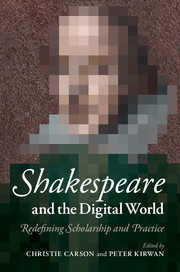Book contents
- Frontmatter
- Contents
- Notes on contributors
- Acknowledgements
- Shakespeare and the digital world
- Part I Defining current digital scholarship and practice
- Part II Defining current digital scholarship and practice
- Half-time: A pause for reflection
- Part III Redefining the boundaries and practices of Shakespeare studies online
- 10 Unlocking scholarship in Shakespeare studies
- 11 Living with digital incunables, or a ‘good-enough’ Shakespeare text
- 12 Shakespeare in virtual communities
- 13 Gamekeeper or poacher?
- Part IV Redefining the boundaries and practices of Shakespeare studies online
- Index
- References
10 - Unlocking scholarship in Shakespeare studies
Gatekeeping, guardianship and open-access journal publication
Published online by Cambridge University Press: 05 July 2014
- Frontmatter
- Contents
- Notes on contributors
- Acknowledgements
- Shakespeare and the digital world
- Part I Defining current digital scholarship and practice
- Part II Defining current digital scholarship and practice
- Half-time: A pause for reflection
- Part III Redefining the boundaries and practices of Shakespeare studies online
- 10 Unlocking scholarship in Shakespeare studies
- 11 Living with digital incunables, or a ‘good-enough’ Shakespeare text
- 12 Shakespeare in virtual communities
- 13 Gamekeeper or poacher?
- Part IV Redefining the boundaries and practices of Shakespeare studies online
- Index
- References
Summary
The debate over open-access journal publication as a feasible platform for new research is fast-moving, increasingly contentious and embroils a wide range of stakeholders with often conflicting agendas – from local university departments to international publishers, librarians to government ministers. What it means for researchers, however, is less clear – particularly within specific disciplines. This chapter will outline the effect that open-access publishing models may have for the research community in Shakespeare studies, the opportunities that a shift towards new models for the dissemination of knowledge allows and the problems it may cause. Open access is an innovation for humanities subjects more widely, but central themes that the debate engages – those of guardianship over knowledge and ‘gatekeeping’ as a means of control over the quality of research – speak directly to the issues of cultural heritage and authority that are so tightly bound up in the study of Shakespeare.
A brief consideration of Hollywood’s 2011 film, Anonymous, illuminates the contexts in which this debate must take place. Anonymous offered a highly imaginative interrogation of the authorship of Shakespeare’s plays; directed by Independence Day’s Roland Emmerich, it received mixed reviews in the broadsheets. Philip French referred to it in The Observer as a ‘shoddy, witless companion piece’ to Tom Stoppard’s popular Shakespeare in Love (1998), while Peter Bradshaw, writing for The Guardian, found it ‘mischievous and amusing’, and recognised its potential as ‘a piece of post-structuralist genius’ (French, 2011; Bradshaw, 2011). The strapline to Robbie Collin’s review for The Telegraph describes Emmerich’s creation as ‘an extravagant new film which merrily sets out to destroy Shakespeare’ by affirming, within the cinematic fiction, that the Earl of Oxford wrote all of Shakespeare’s plays (Collin, 2011). The academic blogging community of Shakespeare scholars held the film at arms’-length, while using it as a springboard to instigate online discussion of the themes it raised.
- Type
- Chapter
- Information
- Shakespeare and the Digital WorldRedefining Scholarship and Practice, pp. 132 - 143Publisher: Cambridge University PressPrint publication year: 2014
References
- 2
- Cited by



